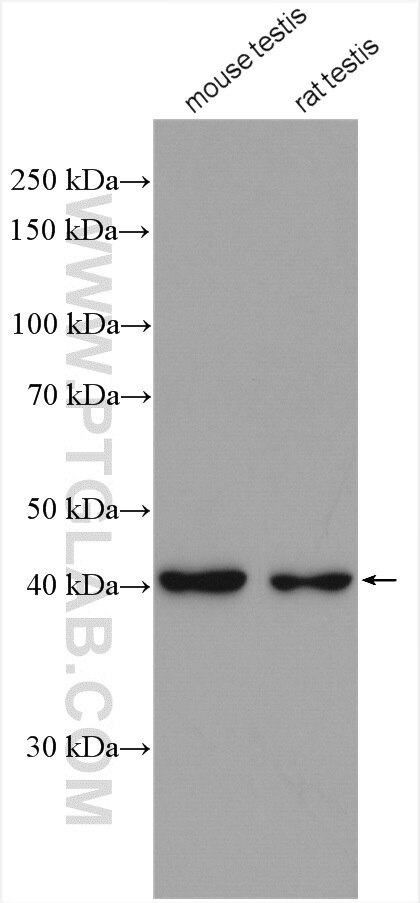Anticorps Polyclonal de lapin anti-ACTRT2
ACTRT2 Polyclonal Antibody for WB, ELISA
Hôte / Isotype
Lapin / IgG
Réactivité testée
Humain, rat, souris
Applications
WB, IF, CoIP, ELISA
Conjugaison
Non conjugué
N° de cat : 16992-1-AP
Synonymes
Galerie de données de validation
Applications testées
| Résultats positifs en WB | tissu testiculaire de souris, tissu testiculaire de rat |
Dilution recommandée
| Application | Dilution |
|---|---|
| Western Blot (WB) | WB : 1:500-1:2000 |
| It is recommended that this reagent should be titrated in each testing system to obtain optimal results. | |
| Sample-dependent, check data in validation data gallery | |
Applications publiées
| WB | See 2 publications below |
| IF | See 1 publications below |
| CoIP | See 1 publications below |
Informations sur le produit
16992-1-AP cible ACTRT2 dans les applications de WB, IF, CoIP, ELISA et montre une réactivité avec des échantillons Humain, rat, souris
| Réactivité | Humain, rat, souris |
| Réactivité citée | Humain, souris |
| Hôte / Isotype | Lapin / IgG |
| Clonalité | Polyclonal |
| Type | Anticorps |
| Immunogène | ACTRT2 Protéine recombinante Ag10597 |
| Nom complet | actin-related protein T2 |
| Masse moléculaire calculée | 376 aa, 42 kDa |
| Poids moléculaire observé | 40-42 kDa |
| Numéro d’acquisition GenBank | BC029499 |
| Symbole du gène | ACTRT2 |
| Identification du gène (NCBI) | 140625 |
| Conjugaison | Non conjugué |
| Forme | Liquide |
| Méthode de purification | Purification par affinité contre l'antigène |
| Tampon de stockage | PBS with 0.02% sodium azide and 50% glycerol |
| Conditions de stockage | Stocker à -20°C. Stable pendant un an après l'expédition. L'aliquotage n'est pas nécessaire pour le stockage à -20oC Les 20ul contiennent 0,1% de BSA. |
Protocole
| Product Specific Protocols | |
|---|---|
| WB protocol for ACTRT2 antibody 16992-1-AP | Download protocol |
| Standard Protocols | |
|---|---|
| Click here to view our Standard Protocols |
Publications
| Species | Application | Title |
|---|---|---|
Hum Reprod Deletion of ACTRT1 is associated with male infertility as sperm acrosomal ultrastructural defects and fertilization failure in human | ||
Development Loss of perinuclear theca ACTRT1 causes acrosome detachment and severe male subfertility in mice. | ||
Cell Rep The perinuclear theca protein Calicin helps shape the sperm head and maintain the nuclear structure in mice. |


